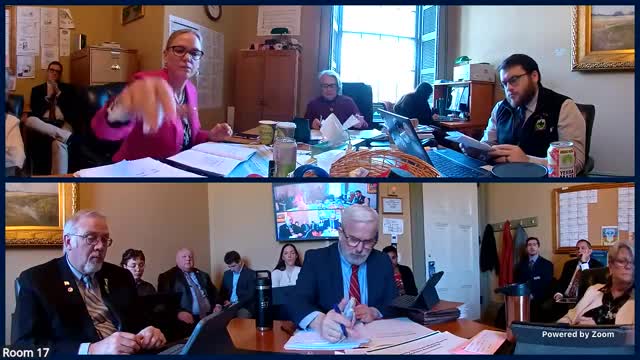Committee weighs adding station wear and PPE limits for firefighters in H.250
Get AI-powered insights, summaries, and transcripts
Subscribe
Summary
Senate Health & Welfare reviewed H.250 language to add "station wear" to PFAS notice requirements and discussed a proposed prohibition on sale of PFAS‑containing firefighting PPE; committee directed staff and agencies to study respirator/airpack components and report back before final action.
The Senate Health & Welfare committee on April 18 considered H.250, a bill carried from the House that would extend PFAS notice requirements and, in later effective dates, prohibit sale of firefighting personal protective equipment (PPE) and station wear that contain intentionally added PFAS.
Under existing law carried from Act 131, manufacturers that sell PPE containing PFAS must provide a written notice at the time of sale and both the manufacturer and purchaser must retain that notice for three years. H.250 would add "station wear"—uniform shirts and pants worn by firefighting personnel under turnout gear—to the items that trigger the notice requirement. Committee staff said the notice change would be effective July 1, 2026.
The draft also contains a prohibition, effective July 1, 2028 in the current draft, on sale or distribution in the state of any PPE or station wear to which PFAS have been intentionally added. Committee members raised concerns about whether critical components—especially respirators and self‑contained breathing apparatus (air packs)—contain PFAS and whether safe, certified non‑PFAS alternatives exist for those components.
Chris Dubey, identified in the transcript as a firefighting advocate, and other firefighter witnesses told the committee that components such as straps and certain layers in air packs can contain PFAS. Committee members said they had not taken full testimony from manufacturers on air‑pack components and flagged that exclusion of respirators or a reportback on availability could be appropriate. One senator said, “we want to accommodate their request as much as possible,” while also acknowledging unresolved technical issues.
Matt Chapman, Director, Department of Environmental Conservation, and staff suggested treating the respirator/air‑pack question as a subject for the requested report so the committee can understand what other states have done and what alternatives are available. Staff recommended working with DEC, ANR and stakeholders to draft language that preserves as much of the proposed prohibition as possible while addressing respirator safety concerns. Committee members directed staff to consult with Matt Chapman and firefighting stakeholders and bring back revised language and recommendations on implementation timing.
The committee did not adopt final prohibitions in the hearing. Members agreed to add station wear to the written‑notice requirement in the draft and to task staff and agencies with preparing detailed information on respirators, air packs and other challenged PPE components. They asked staff to return with redlines and recommended effective dates at a subsequent meeting.
Next steps: staff will work with DEC, ANR and firefighter representatives to identify components that may need exclusion or phased compliance, return with draft language and recommended effective dates, and bring the revised bill back for further committee consideration.
